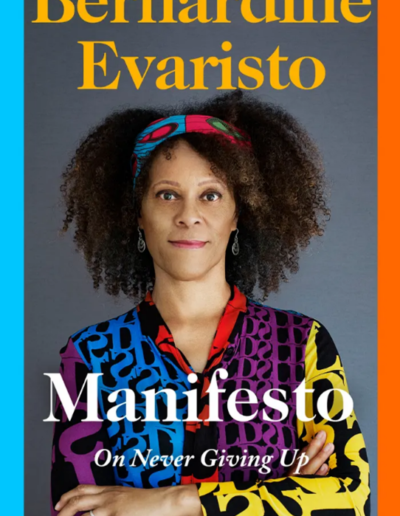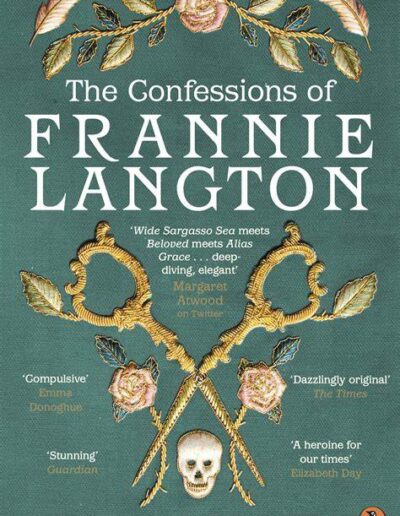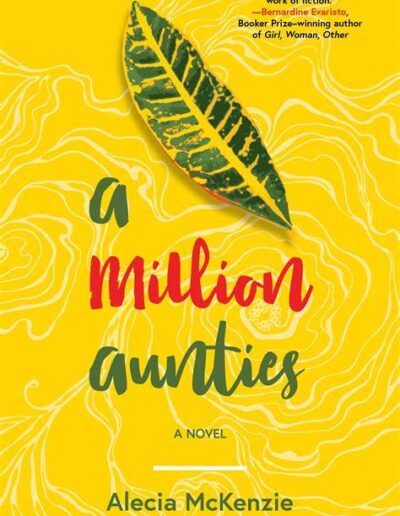What We’re Reading this Black History Month
by Antonio Arch
Hello from London and what seems to be the epicentre of excitement this Black History Month. First observed in October 1987 to mark the 150th anniversary of emancipation in the Caribbean, Black History Month aims to remember and honour the contributions of people of African and Caribbean heritage. 2023’s theme, Saluting our Sisters, celebrates the work of women (many of them forgotten or obscured behind historical revision) towards furthering change, advancement, and social justice. Depending on their remit and mission, organisations, institutions and authorities will focus on black women in industry, science, sport, politics and academia. So at Cayman Connection, we thought that we would take the opportunity to share a selection of authors and books being read, discussed and suggested by members of our Book Club.
Bernardine Evaristo, is a literary powerhouse whose work and activism have paved the way for change and understanding. Evaristo’s multicultural heritage, fascinating early years in theatre and the rapidly changing London, storytelling and recall, profoundly influence her work and enrich her readers. We think her autobiography, Manifesto: On Never Giving Up should be required reading. The book offers readers a profound insight into her life, experiences, and the forces that have shaped her as an individual and as a writer. It’s a powerful testament to resilience and the journey towards self-discovery. Evaristo revisits her multicultural heritage, her experiences growing up as a Black woman in Britain, and her evolution as a writer and activist. She delves into the complexities of identity and the challenges she faced while navigating a society often marked by racism and prejudice.
Manifesto is several books in one volume. It’s a call to action and encourages us all to embrace our identities, regardless of societal expectations of status quo. Her journey from a young girl with dreams to a celebrated author and advocate is both inspirational and empowering. But it’s also a fascinating literary biography, employing lived experience to reveal something of the creative process, the struggles of the publishing world, and the dedication required to succeed in the literary sphere. And if you’re not quite sold on the money and resources that DEI demands, you’ll want to stand up and cheer for equality and change when you’ve finished reading, then go in search for something that you can contribute towards a more equitable society.
Born on November 28, 1959, in London to a Nigerian father and an English mother, Bernadine became acutely aware of the intricacies of identity, race, and culture growing up. These early experiences laid the foundation for her later exploration of these themes in her writing. She showed a passion for storytelling, creativity and academic pursuits early, ultimately shaping her unique voice as a writer and her commitment to addressing issues of race, gender, and identity. Her work spans across various genres, including novels, poetry, essays, and drama. Her groundbreaking 2019 Booker Prize-winning novel, Girl, Woman, Other tells the stories of twelve characters, highlighting the complexities of their lives, experiences, and identities. Both books are groundbreaking contributions to literature (alas, we wanted to mention her novel Mr. Loverman but ran out of space). Their author is a role model who harnesses the creative arts to portray the world we live in right now, and consider how we could apply our strengths when working to improve it.
At our most recent meeting, we discussed A Million Aunties by Alecia McKenzie, a beautifully crafted and heartwarming story that explores themes of family, love, and the power of human connections. Through her eloquent prose and vivid storytelling, McKenzie takes readers on an unforgettable journey of self-discovery and personal growth.
The book is largely driven by its diverse and relatable characters. McKenzie skillfully brings these characters to life, making them feel like cherished members of one’s own family. The author’s writing style is simply enchanting. McKenzie’s prose is rich with evocative descriptions, allowing readers to vividly imagine the bustling streets of Paris, the serene landscapes of Jamaica, and the close-knit community of extended family throughout. Her attention to detail and ability to evoke emotions through her words is truly commendable. A Million Aunties explores universal themes that resonate with readers of all backgrounds. It delves into the importance of embracing one’s heritage, the power of familial (and non-familial) bonds, and the strength that can be found in unexpected places.
Beyond its powerful storytelling and portrayal of rural Jamaica, A Million Aunties is ultimately a celebration of love and resilience. It reminds us that even in the face of loss and adversity, there is always hope and the potential for personal growth. The characters’ journeys, filled with both triumphs and setbacks, serve as a reminder of the human spirit’s indomitable nature.
In 1948, British subjects from the Caribbean answered the call for help and began a new chapter in their lives. Many left homes, families, and familiar surroundings to journey towards an uncertain future. Beryl Gilroy is one of the educators who answered the call for help, playing a crucial role in shaping the post-war landscape of the United Kingdom. Gilroy’s 1976 autobiography Black Teacher recounts a profound journey of empowerment. It begins in 1952, and Gilroy has just arrived from Guyana with both education degree and qualifications (a rarity in postwar early education in Britain), taking readers on a profound journey of discrimination, hostility and eventual empowerment, resilience, and the transformative power of education.
Gilroy’s book is the true-life story of a pioneer of twentieth-century British education through evocative, deeply resonant memories, immersing readers in the vivid world she recreates. Through her words, we witness the real challenges faced by a black teacher from the Caribbean, who navigates a predominantly white education system while also contending with the racial prejudices prevalent in the society of the day. We accompany her through the trials and tribulations of her career and witness her unwavering commitment to her students and unflinching belief in the transformative power of education. We found everything about Black Teacher authentic, heartfelt, and infused with compassion while confronting complex themes of identity, racism, and the quest for equality. Gilroy fearlessly explores the inherent biases and prejudices that permeate educational institutions and the broader society. She sheds light on the challenges faced by marginalized communities, and her poignant insights encourage readers to critically examine the systemic barriers that still persist today.
Gilroy emphasizes the importance of nurturing a child’s individuality, fostering self-esteem, and providing a safe space for learning and growth, beautifully capturing the transformative influence a dedicated teacher can wield, inspiring hope and instilling the belief that education can be a powerful catalyst for change. This candid account of her experiences will leave readers inspired, moved, and compelled to continue championing equality and justice in education. Beryl Gilroy’s legacy as an educator and writer shines brightly, and her words will undoubtedly continue to inspire future generations.
And now, some big news. Be sure to join us for our Book Club meeting in November, when we’ll be talking to our special guest Sarah Collins, whose The Confessions of Frannie Langton by Sara Collins is a remarkable and engrossing novel that takes readers on a captivating journey through the depths of human emotions, injustice, and resilience. With its richly drawn characters, intricate plot, and thought-provoking themes, this book will appeal to readers of the Victorian novel, the gothic, dystopian and admirers of Rebecca’s protagonist and Jane Eyre.
But Frannie Langton is a protagonist like no other. From her humble beginnings as a slave on a Jamaican plantation to her life as a servant in 19th-century London, Frannie’s voice resonates with authenticity and raw honesty. Her narrative provides an unflinching exploration of identity, race, sexuality, and class. The reader can’t not empathize with her struggles and triumphs.
Sara Collins’ writing style is poetic, evocative, and imbued with a remarkable attention to detail. Her prose vividly brings to life the settings of both Jamaica and London, immersing the reader in a world rich with historical context. The lush descriptions of Frannie’s surroundings, whether it’s the vibrant streets of London or eerie plantations, transport readers to another time and place. A story filled with twists and turns, told by an unreliable narrator seamlessly weaves together elements of mystery, historical fiction, and a heartfelt examination of love and betrayal. The narrative unfolds through Frannie’s firsthand account and courtroom testimony, cleverly revealing the truth piece by piece, creating an atmosphere of suspense and anticipation. The novel delves into thought-provoking themes throughout the novel, such as the horrors of slavery and eugenics, the power dynamics of race and class, and the quest for personal freedom. These themes are skillfully explored, prompting readers to reflect on the injustices of the past and their relevance in contemporary society.
This is an exceptional novel that deserves all the praise it has received. It will capture your heart, challenge your perspectives, and leave you in awe of its profound impact. It is a must-read for anyone seeking a powerful and thought-provoking literary experience.
If you haven’t seen it, we highly recommend streaming the TV miniseries on ITV and PBS. Adapted from a screenplay that Collins penned herself, the production is an epic production that combines drama, history, romance and gothic. The result is a translation to the screen that makes it impossible to avert your eyes from the screen.
Black History Month affirms the invaluable cultural enrichment of African and Black Caribbean people; the vibrant traditions, language, music, and cuisine that have become integral parts of British and North American culture, enriching and diversifying society. The significant contributions in fields such as arts, literature, sports, politics, and business, shaping the multicultural landscape of societies today. Celebrating our Sisters further highlights the unsung, heroic women who contributed to transportation, healthcare, construction, and public services industries. We hope you’ll join us for another year of Cayman Connection’s Book Club. We’ve e also made a list of recommended reading for Black History Month that you can access here.




